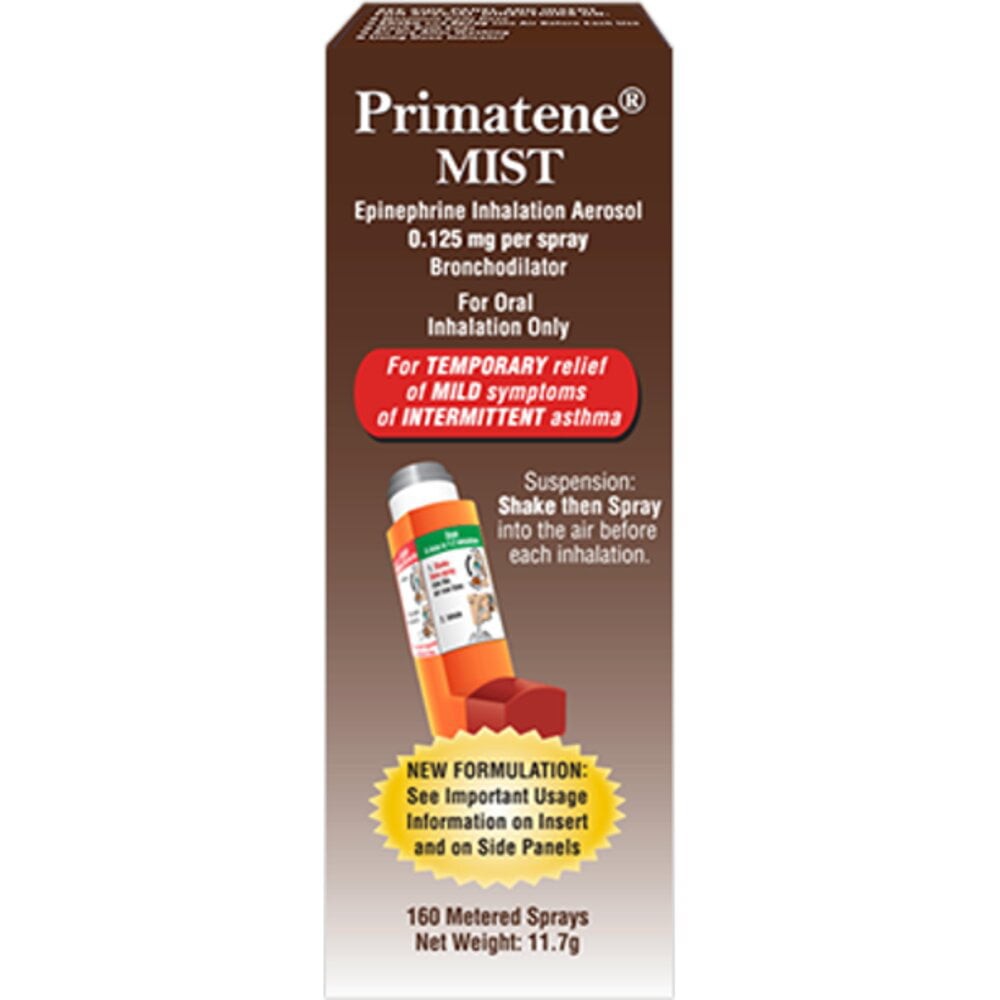
Contents
Epinephrine Inhaled
Epinephrine inhaled is a bronchodilator medication for the temporary relief of mild intermittent asthma symptoms, including wheezing, shortness of breath, and chest tightness. It is administered as an oral spray using an inhaler device, providing quick relief by relaxing the bronchial muscles and dilating the airway.
Epinephrine is an alpha/beta agonist that enhances the activity of alpha and beta receptors, which are protein particles on smooth muscle cells. These receptors respond to epinephrine, a natural hormone that serves various functions in the body. By stimulating beta receptors in the airway, epinephrine produces the desired bronchodilation effect. However, epinephrine is non-selective and can also stimulate alpha receptors, leading to increased heart rate and blood pressure. Other side effects may occur due to the stimulation of alpha and beta receptors in other tissues.
Warnings
- Use epinephrine inhaled only if diagnosed with asthma by a physician.
- Do not use concurrently with monoamine oxidase inhibitors (MAOIs), an antidepressant medication, or within 2 weeks after discontinuing MAOI.
- Consult your physician before using epinephrine inhaled if you have any of the following conditions: high blood pressure (hypertension); heart disease; diabetes mellitus; narrow angle glaucoma; thyroid disease; seizures; previous hospitalization for asthma; prostate enlargement and/or urinary obstruction.
- Avoid using prescription drugs for asthma, weight control, obesity, depression, or psychiatric/emotional conditions, as well as drugs containing phenylephrine, pseudoephedrine, ephedrine, or caffeine.
- Seek medical attention if symptoms do not improve within 20 minutes or if they worsen, if you need more than 8 inhalations in 24 hours, if you have more than 2 asthma attacks in a week, if your asthma worsens, if you experience rapid heartbeat, if you have difficulty sleeping, or if you develop nervousness, tremor, or seizures.
Side Effects
Common side effects of epinephrine inhaled include: nausea, vomiting, stomach upset, dry mouth, bad taste, sore throat, cough, headache, dizziness, sweating, difficulty sleeping, nervousness, tremor, increase in blood pressure, and rapid heart rate (tachycardia).
Seek immediate medical attention if you experience any of the following symptoms or serious side effects while using this drug:
- Fast or pounding heartbeats, fluttering in the chest, shortness of breath, sudden dizziness (serious heart symptoms).
- Severe headache, confusion, slurred speech, severe weakness, vomiting, loss of coordination, feeling unsteady.
- Very stiff muscles, high fever, sweating, confusion, fast or uneven heartbeats, tremors, feeling like you might pass out (severe nervous system reaction).
- Blurred vision, tunnel vision, eye pain or swelling, or seeing halos around lights (serious eye symptoms).
This is not an exhaustive list of side effects or adverse reactions that may occur. Consult your doctor for medical advice or report side effects or health problems to the FDA at 1-800-FDA-1088.
QUESTION
Epinephrine Inhaled Dosages
Suspension for aerosol inhalation:
- 0.125 mg/actuation
Adults and Pediatric:
Mild Asthma:
- Indicated for temporary relief of mild symptoms of intermittent asthma (e.g., wheezing, chest tightness, dyspnea)
Children below 12 years:
- Safety and efficacy not established
Adults and children 12 years or above:
- Take 1-2 orally inhaled inhalations every 4 hours as needed. Start with 1 inhalation, wait at least 1 minute, and administer a second inhalation if symptoms persist. Do not exceed 8 inhalations in 24 hours.
Overdose:
Overdose of epinephrine inhaled may cause an increase in arterial blood pressure, chest pain, irregular heart rhythm, headache, weakness, severe dizziness, nervousness, tremor, and seizures. Treatment may include administration of alpha and beta-blocking agents and supportive measures such as respiratory support.
Drug Interactions
Inform your doctor about all medications you are currently taking to check for possible drug interactions. Do not start, stop, or change the dosage of any medication without your doctor’s recommendation.
- Severe interactions of epinephrine inhaled include: isocarboxazid, phenelzine, tranylcypromine.
The above drug interactions are not exhaustive. For more information, consult the RxList Drug Interaction Checker.
Always inform your doctor, pharmacist, or healthcare provider of all prescription and over-the-counter medications you use, along with their respective dosages. Keep a list of this information and consult your doctor or healthcare provider for any questions about medications.
Pregnancy and Breastfeeding
- Proper asthma control is crucial for maternal and fetal health. Poorly or moderately controlled asthma during pregnancy increases the risk of preeclampsia in the mother and of prematurity, low birth weight, and small size for gestational age in the newborn. Asthma should be optimally controlled during pregnancy, with close monitoring and appropriate medication titration. Avoid using OTC epinephrine inhaled without direction and monitoring by a physician. Epinephrine may interfere with uterine contractility if used during labor. It is not known if inhaled epinephrine is excreted in breastmilk, so consult your physician before using OTC epinephrine inhaled. Do not use any OTC products, including epinephrine inhaled, while pregnant or breastfeeding without first consulting your healthcare provider.
Additional Information
- Use epinephrine inhaled as directed on the label. Do not exceed the recommended dosage.
- Epinephrine inhaled is intended for oral inhalation only. Avoid contact with the eyes.
- Avoid consuming foods and beverages containing caffeine while using epinephrine inhaled.
- Avoid taking dietary supplements with reported or claimed stimulant effects while using epinephrine inhaled.
- The contents of the inhaler are under pressure. Do not puncture or incinerate the inhaler.
- Store epinephrine inhaled safely out of reach of children.
- In case of overdose, seek medical help or contact Poison Control.
Subscribe to MedicineNet’s Allergy and Asthma Newsletter
By clicking "Submit," I agree to the MedicineNet Terms and Conditions and Privacy Policy. I also understand that I may opt out of MedicineNet subscriptions at any time.
Summary
Epinephrine inhaled is a bronchodilator medication for the temporary relief of mild intermittent asthma symptoms, including wheezing, shortness of breath, and chest tightness. Common side effects of epinephrine inhaled include nausea, vomiting, stomach upset, dry mouth, bad taste, sore throat, cough, headache, dizziness, sweating, difficulty sleeping, nervousness, tremor, increase in blood pressure, and rapid heart rate (tachycardia). Consult your doctor if pregnant or breastfeeding.


